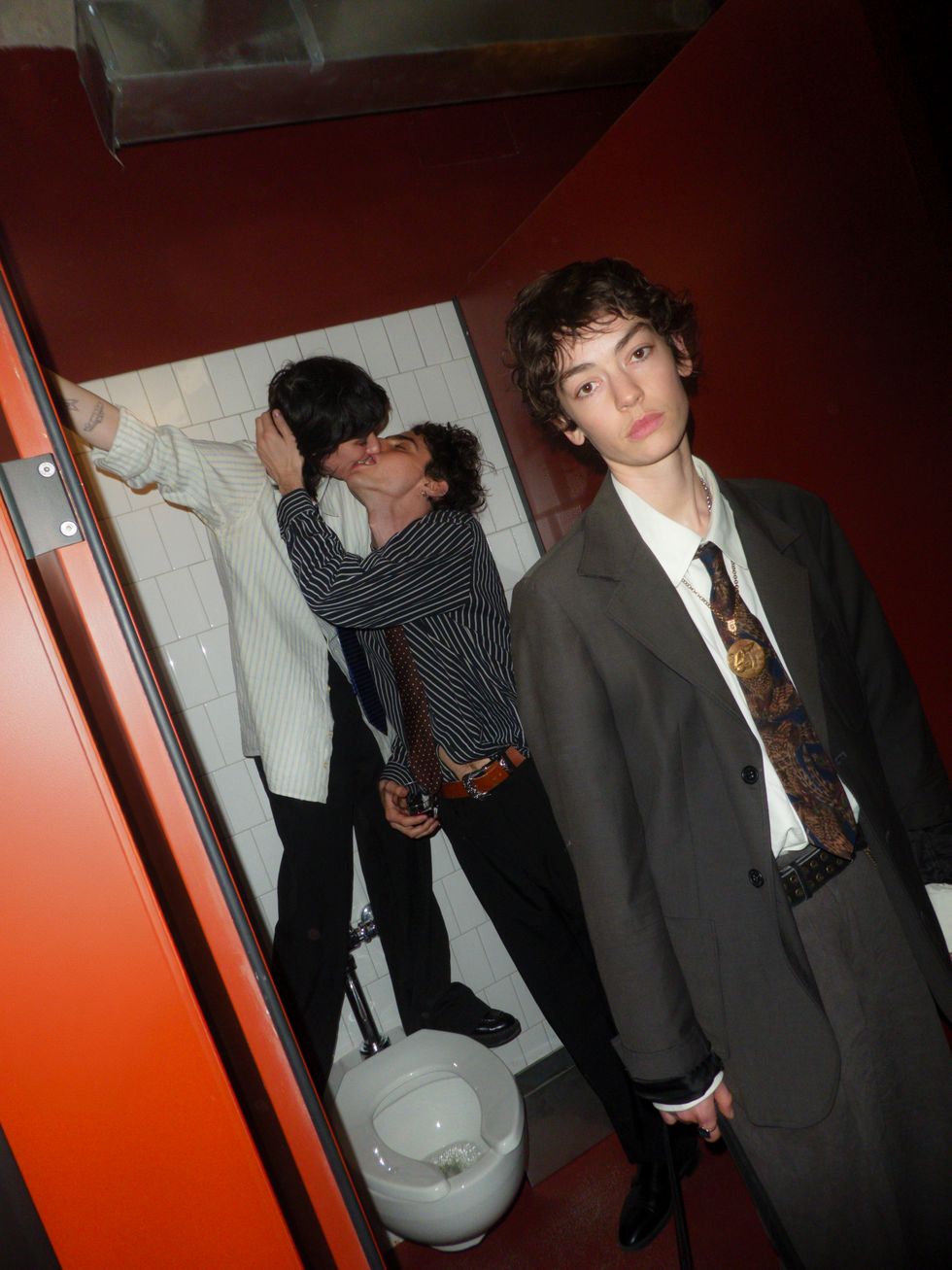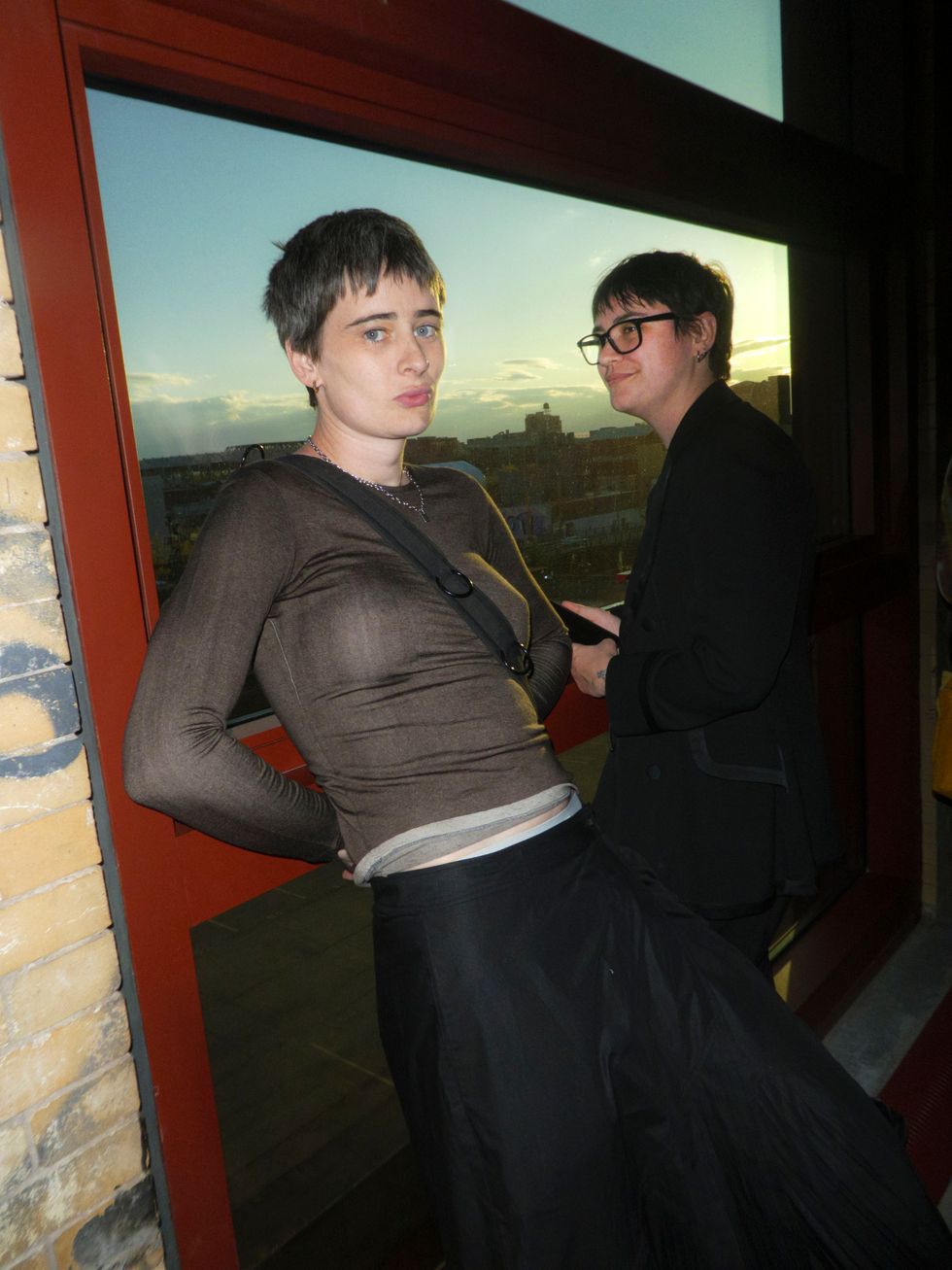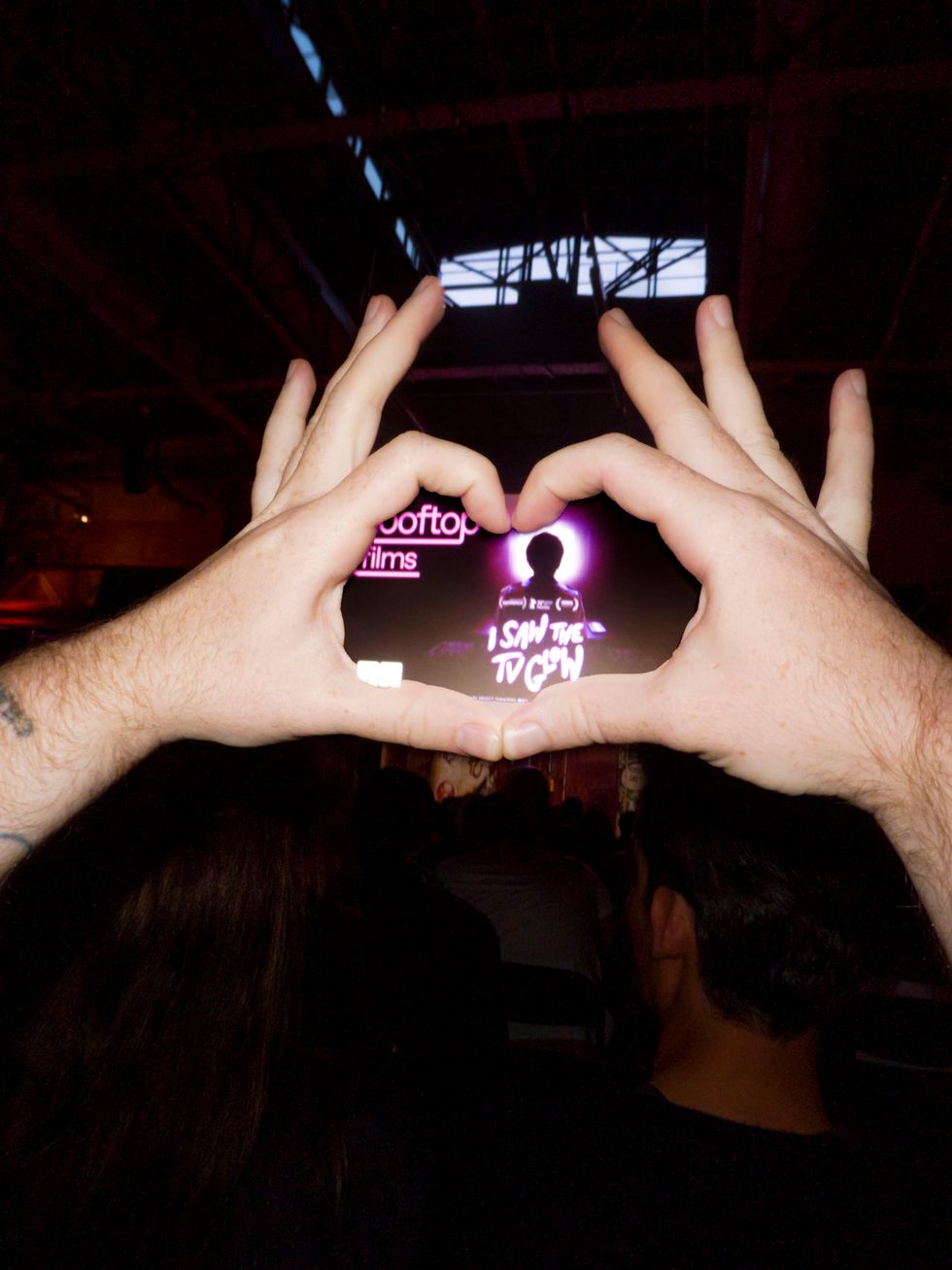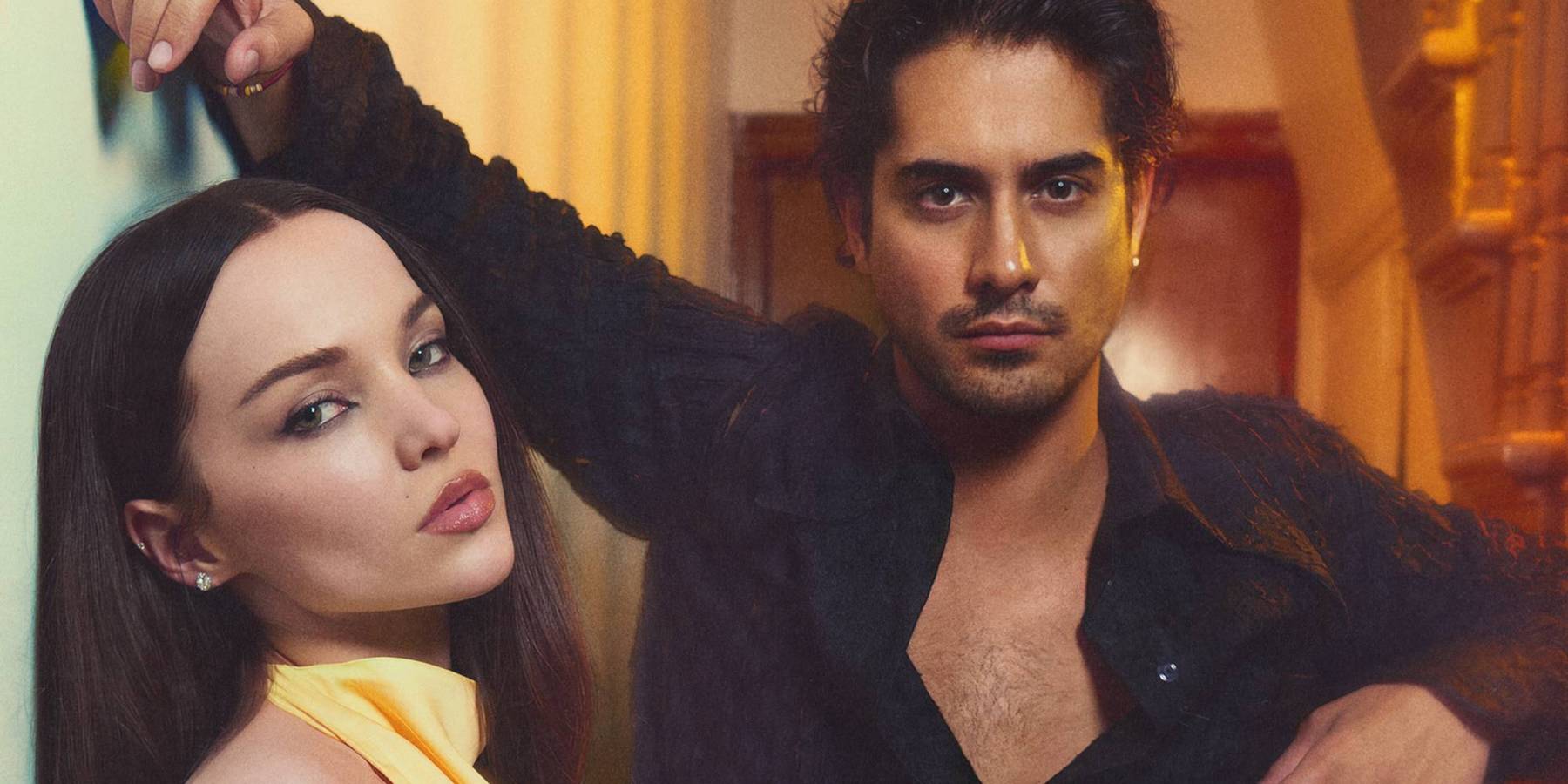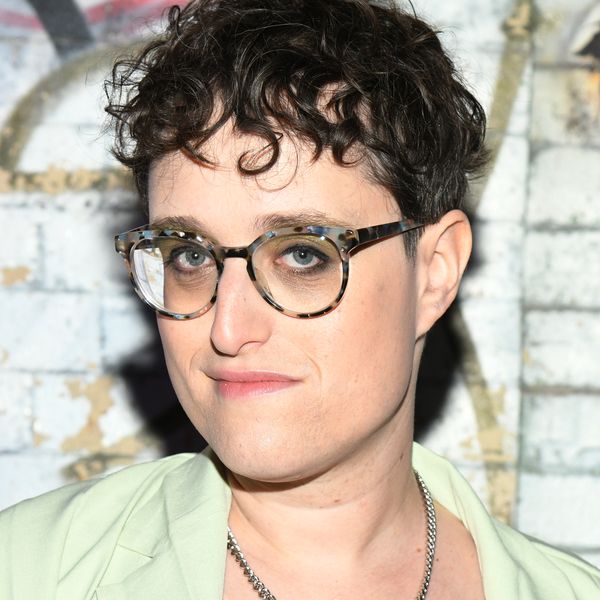
Jane Schoenbrun's 'I Saw The TV Glow' Is an Act of Love
By Tobias Hess
May 02, 2024Few experiences have left me as unmoored as seeing I Saw The TV Glow at a 10 AM press screening. The film circles the story of Owen (played by Ian Foreman and Justice Smith), a shy boy growing up in dreary suburbia who finds solace and companionship through a Buffy-esque procedural, The Pink Opaque, introduced to him by an older confidante, the brooding Maddie (Brigette Lundy-Paine). As the pair find themselves increasingly enthralled by the show’s strange magic, they also find themselves trapped in its creeping limbo.
Art, especially for queer and trans youth, can serve as a life-saving escape. But just exactly where does that escape lead to? A vast expanse to roam, or a cell, locked and put away? As I watched the film, the echoes of months spent wasting in my bedroom as a young boy, listening to music, retreating into the digital, rang around my skull. “When I think about that stuff, I feel like someone took a shovel and dug out my insides,” Owen says in response to Maddie questioning his sexuality. “I know there’s nothing there, but I’m still too nervous to open myself up to check.”
In just two films, Schoenbrun has shown themself to be one of the great articulators of the deep dread and longing that defines so much of queer and trans adolescence. In their first film, the microbudget We’re All Going to the World's Fair, a young teenager’s reality begins to disintegrate after she becomes obsessed with an online role-playing game. Like I Saw The TV Glow, the film brings to light the natural horror that can arise when isolation and escape ferment to something more akin to rotted sequestration. That Schoenbrun continues to explore such themes is a gift.
A giddy gratitude permeated I Saw The TV Glow’s premiere, a collaboration between A24 and Rooftop Films at Powerhouse Arts in Gowanus, Brooklyn. The film’s cast hobnobbed with collaborators and admirers alike, alongside some of indie music’s best. The film was scored by stalwart musician Alex G, but also flexes original songs from the likes of Phoebe Bridgers, Caroline Polacheck, Yeule and Sloppy Jane, whose lead singer, Haley Dahl, was at the premier alongside Kyp Malone (TV on the Radio), cast member Lindsey Jordan (Snail Mail) and L'Rain (Taja Cheek) who DJed the event. Check out exclusive photos of the event below.
PAPER caught Schoenbrun the morning before I Saw The TV Glow’s premiere to chat about the challenges of discussing the film, the emotional process behind writing and making it and the experience of curating a perfect mixtape.
It must have been heavy to make this film, but I imagine that now talking about it with the press ad nauseum is a whole other beast. How’s that’s been for you?
The only way I can survive a press tour like his one is by treating it as some weird combination of therapy and writing my memoir. The film is still just coming out, but I've been talking about it for a while now. I find myself just shit-talking movies that I don't like, or talking about my experience making the movie as much as I'm talking about what the movie is about. That's the way that it's like therapy: I’m unpacking the strangeness of it all through the press.
[But as for the film itself], it's a film that I wrote while going through some really intense things. It's the film that I wrote very early in my physical transition, and while dealing with the fallout of the immediate catastrophe that is your life when you come out. By the time I made the film, two years after I wrote it, I was in such a different place. And I was in this early honeymoon phase with my new identity. You inevitably will change from the person you were when you wrote the film, but, in this film, I feel like it's been so much more pronounced. It almost feels like I was catching up on 20 years of growth that I didn't get to do pre-transition.
How did you show up to set every day and not just be riddled with those feelings?
I tried to conjure those feelings, honestly. One of the joys of production is making something beautiful and joyful. And I think the film is representative of this different person I became in the years between writing and filming. It's just such a glittering, colorful movie, with so many flickers of queer joy in it. And that was me in the present tense as I was shooting the movie.
I spent a few days alone before we started production. I left my phone at home and went to the cemetery around my house and brooded around and thought through the movie and tried to tap back into those extremely raw feelings that the script was born from — from my early transition and this cataclysm of emotion. It was nice that I moved past it and could direct from it a bit. I think I did capture something within that moment, but I'm also glad to not still be living in that moment.

In the film, this joy you mention feels really complicated, be it the joy of watching television, or in the joyous escape of being in a DIY music space. Tell me about the push and pull of how you depict joy here.
The movie is a reflection on growing up in the suburbs as a queer person and searching for spaces that feel like home. I think that's a complex experience. Even if that place [you find joy in] is a TV show that you're watching, that's still a corporate product. Even if it's feeding you some sort of magical queer-coded signal, it's not necessarily liberatory. But it can feel soothing to tap into.
I thought of the movie as all about finding places to hide before you're ready to come out of the closet. [In the film] Owen and Maddie are gravitating towards these hidden places in suburbia where they can feel more at home: that could be a TV show, that could be underneath a parachute, that can be inside a goth club on the outskirts of town. Throughout the movie, these spaces are almost becoming mutated or contaminated and the spaces that were once refuges or places to hide start to become more like prisons by the end of the movie.
I want to talk about the end of the movie, because I feel like it's one of the more surprising ends we’ve seen in contemporary cinema. I'm curious about the process for you in shaping that ending. How did you figure out where the story would go?
I think that the movie is about half of someone's life, and in this sense half of my life, spent doing everything I could to repress and avoid a thing that, once I finally saw it, was both liberatory and absolutely terrifying. Once you see a thing you can't unsee, which was in my case, transness, you're faced with two bad options. One is likely social death and estrangement from everything that you've thought of as reality. And the other is continuing to live a life that isn't yours and isn't right. And that's just an incredibly heavy and overwhelming thing. For me, as a child of the 1990s in suburbia, in this very homogenized and mono-cultural place, I was always told in school that I could be anything I wanted, but they definitely didn't mean trans. There was just this instinct to apologize for existing and apologize for being my true self that was instilled in me from the youngest age. This is a movie about seeing this thing that is inside you, that despite your attempts to distance yourself from, is unavoidable and inevitable.
To then take that narrative beyond that, towards a more traditionally cathartic, Hollywood, trans kind of narrative, like, Oh, and now we live happily ever after in the right body and soul! would be so disrespectful to my lived experience. You get to the beginning of transition, where there is already so much damage that has already been done, and then the work becomes healing. That's how I like to think of transition, I don't so much use the word “transition” in my own understanding of my own gender exploration. I think of it as healing from that half of my life where I wasn't myself and I was being told to be ashamed of my true self. I think that’s where we leave Owen in the movie, at the very beginning of that process.
A lot of young trans queer kids are going to be seeing this movie, which is, in many ways, about the perils of latching onto media. I'm wondering what your feelings are about a new generation encountering this movie and what it might mean and signify to them?
I think if the movie was as simple as saying, “Watch out for emotional attachments to media or fiction,” l would be doing a disservice to my own experience growing up. It was weird how attached I was to Buffy The Vampire Slayer. It was weird how I basically put all of my emotional energy and love into that television show instead of my own life, but it was a coping mechanism. It was similar with the hug that Elliott Smith's music gave me growing up, or any of the other music that got me through my teens. I feel like I owe my life to that experience in so many ways. It's amazing to be a full person now and to not need to clutch so tightly onto fiction or expressions of a lack, that I'm listening to to make me feel less alone. I am very happy to be less dissociative now and less cripplingly attached to fiction. But that doesn't mean that I don’t still look to art and media for something to make me feel less alone or to help me understand myself or the magic of the world. I have such a deep belief in that in terms of my own art. I am trying to make art for a 16-year-old me. I don't want kids rewatching I Saw the TV Glow for the next 20 years instead of transitioning, if that's the choice, but I do hope that the film can be meaningful. Otherwise, it just wouldn't be worth the energy and the emotional expense of opening yourself up like this. I think of it as an act of love and care and I hope it can be that for people.
I think it certainly will, as will the soundtrack. I can't remember the last time there was a soundtrack that I wanted to listen to in my day-to-day like this.
I worked really hard to make a great fucking soundtrack that would be something that I would be obsessed with as a teenager, so I really hope that it can be that for folks as well.

What was the process of assembling it? And what were the conversations you were having as you put it together?
It was a lot of care, you know. I had never curated what I thought of as a mixtape from scratch, but I knew how to work with a bunch of other artists. And give them some oversight on what they're doing and the vibe. I did as much as each artist wanted me to do, like making them mixes and talking to them about influences, but I just gave each artist what they needed to write a beautiful song that could fit as part of this larger piece. And then I just obsessively listened to it hundreds and hundreds of times and curated the track listing. I think of my filmmaking almost as mixtape-making in a way. I'm very obsessive when it comes to the experience of the thing. And a lot of care went into this.
This is your second film working with Alex G, which is such a cool collaboration. What's that kind of creative collaboration been like for you, and how did that start?
It’s so amazing. I constantly wake up, and I'm like, “I can't believe I get to work with Alex.” I think he's like one of the most talented living artists and musicians. I'm in awe of watching him work, it's like total magic to me. I'll give him a little bit of guiding direction and he'll just disappear for 30 minutes and come back with the most beautiful thing I've ever listened to.
He said a nice thing to me, he was like, “I feel like you and I get along because we both kind of want to fuck it up. I can do a lot of things, but I can't do it right. I can't do Hans Zimmer.” Which I think is wrong, I think he could do Hans Zimmer. But I think he really likes fucking it up on purpose, of music being a little off or a little chopped and screwed. I think that’s very compatible with the type of filmmaking that I find myself drawn to. He's just such a generous collaborator. I really do love building a filmography that speaks to itself and I love that these first two movies have had so much of his DNA in there.

Party photography: Alex Burholt
From Your Site Articles
Related Articles Around the Web
MORE ON PAPER
Entertainment
Dove Cameron and Avan Jogia Broke Their Molds
Photography by Gustavo Chams / Story by Joan Summers
Photography by Gustavo Chams / Story by Joan Summers
18 February
ATF Story
Madison Beer, Her Way
Photography by Davis Bates / Story by Alaska Riley
Photography by Davis Bates / Story by Alaska Riley
16 January
Entertainment
Cynthia Erivo in Full Bloom
Photography by David LaChapelle / Story by Joan Summers / Styling by Jason Bolden / Makeup by Joanna Simkim / Nails by Shea Osei
Photography by David LaChapelle / Story by Joan Summers / Styling by Jason Bolden / Makeup by Joanna Simkim / Nails by Shea Osei
01 December
Entertainment
Rami Malek Is Certifiably Unserious
Story by Joan Summers / Photography by Adam Powell
Story by Joan Summers / Photography by Adam Powell
14 November
Music
Janelle Monáe, HalloQueen
Story by Ivan Guzman / Photography by Pol Kurucz/ Styling by Alexandra Mandelkorn/ Hair by Nikki Nelms/ Makeup by Sasha Glasser/ Nails by Juan Alvear/ Set design by Krystall Schott
Story by Ivan Guzman / Photography by Pol Kurucz/ Styling by Alexandra Mandelkorn/ Hair by Nikki Nelms/ Makeup by Sasha Glasser/ Nails by Juan Alvear/ Set design by Krystall Schott
27 October

